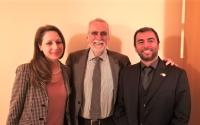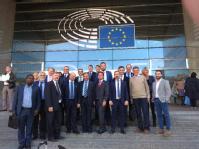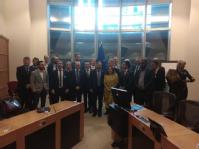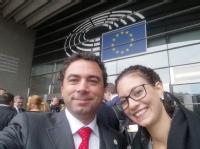News: ABSPIE recent initiatives
ABSPIE Lab COVID-19 contingency activities
The Applied Biomedical Signal Processing Intelligent eHealth (ABSPIE) Lab has been deeply dealing with COVID-19 since the first few cases in the UK.
Led by Dr Pecchia, the ABSPIE Lab multidisciplinary Team has been involved in several activities, briefly described below, giving a significant contribution to tackle the COVID-19 pandemic.
Warwick School of Engineer at the World Congress of Clinical Engineering
The third edition of the III International Clinical Engineering and Health Technology Management Conference (#ICEHTMC2019, http://www.icehtmc2019.com/ ) was held last week in Rome, from the 20th to the 22nd of October 2019. This a relatively young event (i.e., third edition), but certainly a great success with more than 750 delegates from all the Continents focusing on UN Global Sustainable Goals related to health and healthcare technologies.
We had the opportunity to demonstrate the great work we are doing on the design, regulation, assessment and management of Medical Devices for EU and Global Health.
This was a great opportunity to meet a significant number of colleagues and former students, who again confirmed their appreciation, respect, esteem and friendship for the work we do.
Our School contributed to the success of the ICEHTMC2019 in many ways. Dr Leandro Pecchia was one of the co-chairs of the conference, with Adriana Velazquez Berumen (WHO) and the Officers of the Italian Society of Clinical Engineering.
Our PhD students were awarded the student best paper award (Davide Piaggio) and two Health Technology Challenges (Martina Andellini and Davide Piaggio). Kallirroi Stavrianou, our PDRA, was awarded the IFMBE CED appreciation award for her outstanding international contribution. Then Alessia Maccaro (Marie Curie Fellow in the Applied Biomedical Signal Processing and Intelligence eHealth Lab) presented her project and the work done so far on ethical issues arising from poor EU medical device norms' universality, Busola Oronti (PhD stud) her project on the application of Internet of Medical Things (IoMT) in Africa, Mihaela Porumb (PhD Studs) her work on deep learning and hypoglycemia detection via ECG, Rossana Castaldo (PDRA) the work done with Leandro on circadian-cycles tracking via ECG and deep learning (EPSRC founded Cyclops project).
In addition, Dr Leandro Pecchia was invited to give a keynote on HTA and Medical Device, to present his work on Clinical Engineering in low-income countries and to participate in a round table (i.e., education of Clinical Engineering in Europe). Moreover, in collaboration with the IUPESM Woman Engineers and Physicists for health, Dr Pecchia organised and Chaired a special session focusing on the need for more collation among Biomedical Engineers, Clinical Engineers and medical physicists, which was particularly well attended also because of the participation of the Ministry of Research of Montenegro (Dr Sanja Damjanovic, Medical Physicist), WHO Senior Advisor for Medical Devices (Adriana Velasquez, Clinical Engineer) and Magdalena Stoeva (IUPESM Treasurer, Biomedical Engineer).
Probably this was not strictly needed, but certainly this event helped in further promoting the great work that Warwick is doing in the field of Global Health and Clinical Engineering!
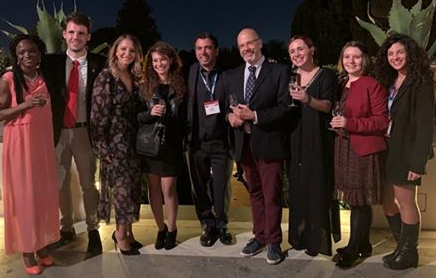
Warwick Attendees at the ICEHTMC2019 in the photo (from left): Busola Oronti, PhD stud, Davide Piaggio, PhD stud, Alessia Maccaro, Marie Skłodowska-Curie Fellow, Rossana Castaldo (PDRA), Leandro Pecchia (Associate Prof), Silvio Pagliara (PDRA), Kallirroi Stavrianou (PDRA), Mihaela Porumb (PhD stud), Andellini Martina (PhD stud).
Warwick Engineering Impact: helping Greece and WHO in setting the Hellenic Health Technology Assessment (HTA) Agency, paying the due attention to medical devices
It was not long time ago, when (biomedical) engineers were very little involved in any HTA. Warwick Engineering has played a key role in supporting change in this area, achieving significant impact in relatively little time. Since 2015, when Dr Leandro Pecchia was elected as Chair of the IFMBE HTA Division, all the Biomedical Engineering Conferences have been giving growing space to HTA papers, round tables and keynotes. As result, the majority of BME degrees in Europe, USA and Asia are starting introducing HTA as core topic for BME. As result, only 4 years later, WHO is systematically considering BMEs among the international experts to support their action in different Countries, and often Warwick BMEs. Last weekend, Dr Pecchia has been in Greece, on WHO invitation, to deliver an intensive training on HTA and to review and provide feedback on recently proposed Greek regulation on HTA, before this will be enforced in the next few months. The training was addressed to 20 Officers from the Greek Ministry of Health, and was followed by a workshop aiming at discussing the draft regulation and prepare formal recommendation, basing also on the recent publication* leaded by Warwick on HTA of medical devices.
From left to right:
- Dr Oriana Ciani, Bocconi University
- Prof Nicolas Pallikarakis, INBIT (Greek National Institute for Biomedical Technologies)
- Dr Leandro Pecchia, University of Warwick
* Polisena, J., Castaldo, R., Ciani, O., Federici, C., Borsci, S., Ritrovato, M., ... & Pecchia, L. (2018). Health technology assessment methods guidelines for medical devices: how can we address the gaps? The International Federation of Medical and Biological Engineering perspective. International journal of technology assessment in health care, 34(3), 276-289.
Public datasets of human balance could enable a consensus on the optimal methods for assessing balance and fall risk
Balance impairment and falls are not uncommon in later life. One in three individuals aged 65 and over experiences an accidental fall every year, with head injuries and hip fractures among the most severe consequences. Accordingly, several methods and techniques for assessing balance and fall risk have been developed. Posturography is probably the most common technique and entails the measurement of the body’s centre of mass (CoM) or the centre of pressure (CoP) displacements during standing.
An issue arises when researchers propose and compare new methods of posturography data analysis from different subjects across centres. These data are usually collected following different protocols. Moreover, there are also differences in the algorithms to process and characterise the data. This heterogeneity sometimes generates conflicting findings, most likely produced by a sizeable between-study variability and a low statistical power (i.e. small sample size). As a result, there is still a lack of consensus on the best methods to analyse posturography data in order to extract meaningful information about the subject's balance and fall risk.
11th of October 2018, European Parliament Interest Group on Biomedical Engineering (EPIG BME) Meeting in the European Parliament
Since 2015, Dr Pecchia has coordinated the collaboration among the European Alliance of Medical and Biological Engineering and Science (EAMBES) and the European Parliament through the establishment of the first European Parliament Interest Group on Biomedical Engineering (EPIG BME).
In the framework of this collaboration, the second EPIG BME meeting was organised in the European Parliament the 11th of October 2018. The final agenda is below and the relevant twits are available at https://goo.gl/VMVbMG
This meeting brought together WHO representatives, ‘African, Caribbean and Pacific and European Union (ACP-EU) representatives and the most influential BME representatives form 4 continents (i.e., Europe, USA, Africa and Asia) via their scientific associations: the International Federation of Medical and Biomedical Engineering (IFMBE), International Organization for Medical Physics (IOMP) and their umbrella organization the International Union for Physical and Engineering Sciences in Medicine (IUPESM).
The topics discussed during the meeting where three:
· recognise BME as independent profession, by including BME as independent discipline in the ESCO database;
· to provide an independent space for research in biomedical engineering field creating a BME panel in the 3 European schemes for excellent science (e.g., ERC, FET and MSCA)
· establish stable collaboration with Africa Union in order to help them harmonizing their regulations on medical devices and medical locations among different African Courtiers and with the European one
The meeting was very well attended, with eminent and competent representatives from the European Parliament, European Commission, WHO and four Scientific Societies (EAMBES, IFMBE, IUPESM, IOMP).
· EPIG BME Parliamentary Members: Nicola Caputo (Italy, chair), Lara Comi (Italy, video), Neena Gill (UK, present), Lojze Peterle (Slovenia, not present, Peterle’s assistants), Marijana Petir (Croatia, present at the opening, Petir’ assistants stayed for all the meeting), Davor Škrlec (Croatia, present) and Cécile Kyenge (Italy, participated for 30min due to other commitments).
· European Commission Member: Bernd Rainer, DG Research (present).
· Speakers: Prof Panayiotis Kyriacou (UK, EAMBES President); Dr Umberto Bracale (Italy, Assistant Prof of Surgery at the University Federico II of Naples); Miss Tanja Valentin (Belgium, Director External Affairs, MedTech Europe); Prof Jari Hyttinen (Finland, EAMBES Fellow Chair); Dr Ashenafi Hussein (Ethiopia, IFMBE African Working Group on Biomedical Engineering); Miss Adriana Velazquez (Switzerland, Focal Point of Medical Devices at World Health Organization, WHO); Dr Leandro Pecchia (UK, University of Warwick and IUPESM Secretary General).
· Open discussion: moderators: Prof Shankar Krishnan (USA, IFMBE President); Prof Timo Jämsä (Finland, EAMBES Elected President), Prof Ratko Magjarevic (Croatia, IFMBE Elected President), Prof Marc Nyssen (Belgium, IFMBE Treasurer), Prof Slavik Tabakov (UK, IUPESM Past President), Prof Nicolas Pallikarakis (Greece, EAMBES), Dr Ernesto Iadanza (Italy, Chair IFMBE HTA Division), Prof Steven Keevil (UK, IUPESM), Mr Mariano Votta (Italy, Cittadinanzattiva), Dr Stefano Bergamasco (Italy, AIIC), Dr Antonella Belotti (Italy, Medical Doctor), Dr Carmelo De Maria (Italy, University of Pisa), Dr Peter Grainger (Irland, Naas General Hospital), Dr Magdalena Stoeva (Bulgaria, Medical University of Plovdiv), Dr Almir Badnjevic (Bosnia and Herzegovina, International BURCH University) and Dr Giuseppe Braghieri (Italy, Medical Doctor).
The ABSPIEH was represented by Dr Leandro Pecchia and Dr Rossana Castaldo.

